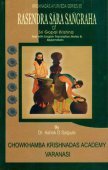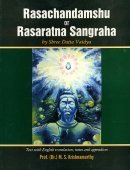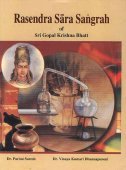Tuttha, Tuṭṭha, Tutthā: 18 definitions
Introduction:
Tuttha means something in Buddhism, Pali, Hinduism, Sanskrit, Jainism, Prakrit, biology. If you want to know the exact meaning, history, etymology or English translation of this term then check out the descriptions on this page. Add your comment or reference to a book if you want to contribute to this summary article.
In Hinduism
Ayurveda (science of life)
Rasashastra (Alchemy and Herbo-Mineral preparations)
Source: Wisdom Library: Rasa-śāstraTuttha (तुत्थ) is a Sanskrit technical term corresponding to “Copper Sulphate”. It is also known as Sasyaka. It is commonly used in Rasaśāstra literature (Medicinal Alchemy) such as the Rasaprakāśasudhākara or the Rasaratna-samuccaya. Tuttha is an ingredient often used in various Ayurvedic recipes and Alchemical preparations.
Nighantu (Synonyms and Characteristics of Drugs and technical terms)
Source: WorldCat: Rāj nighaṇṭu1) Tutthā (तुत्था) or Tulyā is another name for Nīlī, a medicinal plant possibly identified with Indigofera tinctoria Linn. (“true indigo”), according to verse 4.80-83 of the 13th-century Raj Nighantu or Rājanighaṇṭu. The fourth chapter (śatāhvādi-varga) of this book enumerates eighty varieties of small plants (pṛthu-kṣupa). Together with the names Tutthā and Nīlī, there are a total of thirty Sanskrit synonyms identified for this plant.
2) Tutthā (तुत्था) is also mentioned as a synonym for Mahānīlī which is a variety of Nīlī: a medicinal plant possibly identified with Indigofera tinctoria Linn. (“true indigo”), according to verse 4.80-83. Together with the names Tutthā and Mahānīlī, there are a total of eight Sanskrit synonyms identified for this plant.
Unclassified Ayurveda definitions
Source: Wisdom Library: Āyurveda and botanyTuttha (तुत्थ) refers to “copper sulfate”, and is used throughout Ayurvedic literature such as the Caraka-saṃhitā and the Suśruta-saṃhitā. ‘Copper-sulfate’ is a potent sulfate (synthetic sulfur-based ingredient) of Salt and Copper, used as an antidote for poisoning by phosphorus and is also used to prevent the growth of algae.
Source: Ancient Science of Life: Vaidyavallabha: An Authoritative Work on Ayurveda TherapeuticsTuttha (तुत्थ) refers to “blue vitriol” and is mentioned as an ingredient of metallic drugs for the treatment of Visphoṭaka and Vraṇa, as mentioned in the 17th-century Vaidyavallabha (chapter 3) written by Hastiruci.—The Vaidyavallabha is a work which deals with the treatment and useful for all 8 branches of Ayurveda. The text Vaidyavallabha (mentioning tuttha) has been designed based on the need of the period of the author, availability of drugs during that time, disease manifesting in that era, socio-economical-cultural-familial-spiritual-aspects of that period Vaidyavallabha.

Āyurveda (आयुर्वेद, ayurveda) is a branch of Indian science dealing with medicine, herbalism, taxology, anatomy, surgery, alchemy and related topics. Traditional practice of Āyurveda in ancient India dates back to at least the first millenium BC. Literature is commonly written in Sanskrit using various poetic metres.
In Buddhism
Theravada (major branch of Buddhism)
Source: Pali Kanon: Pali Proper NamesA lay disciple of Natika who died and was reborn in the Suddhavasa, there to attain Nibbana. S.v.358, D.ii.92.
Theravāda is a major branch of Buddhism having the the Pali canon (tipitaka) as their canonical literature, which includes the vinaya-pitaka (monastic rules), the sutta-pitaka (Buddhist sermons) and the abhidhamma-pitaka (philosophy and psychology).
Biology (plants and animals)
Source: Google Books: CRC World Dictionary (Regional names)1) Tuttha in India is the name of a plant defined with Elettaria cardamomum in various botanical sources. This page contains potential references in Ayurveda, modern medicine, and other folk traditions or local practices It has the synonym Zingiber minus Gaertn. (among others).
2) Tuttha is also identified with Indigofera tinctoria It has the synonym Indigofera bergii Vatke ex Engl. (etc.).
Example references for further research on medicinal uses or toxicity (see latin names for full list):
· Nomenclator Botanicus (1797)
· Journal of Biosciences (1993)
· Taxon (1982)
· Cytologia (1989)
· The Gardeners Dictionary
· Indigofera (1768)
If you are looking for specific details regarding Tuttha, for example extract dosage, side effects, chemical composition, pregnancy safety, health benefits, diet and recipes, have a look at these references.

This sections includes definitions from the five kingdoms of living things: Animals, Plants, Fungi, Protists and Monera. It will include both the official binomial nomenclature (scientific names usually in Latin) as well as regional spellings and variants.
Languages of India and abroad
Pali-English dictionary
Source: BuddhaSasana: Concise Pali-English Dictionarytuṭṭha : (pp. of tussati) satisfied.
Source: Sutta: The Pali Text Society's Pali-English DictionaryTuṭṭha, (pp. of tussati to be satisfied) pleased, satisfied; often combined w. haṭṭha (q. v.) i.e. tuṭṭha — haṭṭha J. I, 19 or haṭṭha-tuṭṭha J. II, 240; cp. tuṭṭha-pahaṭṭha J. II, 240.—Sn. 683; It. 103; J. I, 62 (°mānasa), 87, 266 (°citta), 308 (id.); IV, 138.—tuṭṭhabba (grd.) to be pleased with Vin. IV, 259. (Page 304)

Pali is the language of the Tipiṭaka, which is the sacred canon of Theravāda Buddhism and contains much of the Buddha’s speech. Closeley related to Sanskrit, both languages are used interchangeably between religions.
Sanskrit dictionary
Source: DDSA: The practical Sanskrit-English dictionaryTuttha (तुत्थ).—[tud-thak]
1) Fire.
2) A stone.
-ttham Sulphate of copper, usually applied to the eyes as a sort of collyrium or medical ointment.
-tthā 1 Small cardamoms.
2) The indigo plant.
Derivable forms: tutthaḥ (तुत्थः).
Source: Cologne Digital Sanskrit Dictionaries: Shabda-Sagara Sanskrit-English DictionaryTuttha (तुत्थ).—m.
(-tthaḥ) Fire. f.
(-tthā) 1. Indigo. 2. Small cardamoms. n.
(-tthaṃ) 1. A collyrium extracted from the Amomum zanthorrhiza. 2. Blue vitriol, sulphate of copper, especially medicinally considered as an Anjan, or application to the eyes. E. tud to pain, thak Unadi aff.
Source: Cologne Digital Sanskrit Dictionaries: Benfey Sanskrit-English DictionaryTuttha (तुत्थ).—n. Blue vitriol, [Suśruta] 2, 13, 2.
Source: Cologne Digital Sanskrit Dictionaries: Cappeller Sanskrit-English DictionaryTuttha (तुत्थ).—[neuter] blue vitriol.
Source: Cologne Digital Sanskrit Dictionaries: Monier-Williams Sanskrit-English Dictionary1) Tuttha (तुत्थ):—n. (m., [cf. Lexicographers, esp. such as amarasiṃha, halāyudha, hemacandra, etc.]) blue vitriol (used as an eye-ointment), [Suśruta]
2) fire, [cf. Lexicographers, esp. such as amarasiṃha, halāyudha, hemacandra, etc.]
3) n. a collyrium, [cf. Lexicographers, esp. such as amarasiṃha, halāyudha, hemacandra, etc.]
4) a rock, [Uṇādi-sūtra] k.
5) Tutthā (तुत्था):—[from tuttha] f. the indigo plant, [cf. Lexicographers, esp. such as amarasiṃha, halāyudha, hemacandra, etc.]
6) [v.s. ...] small cardamoms, [cf. Lexicographers, esp. such as amarasiṃha, halāyudha, hemacandra, etc.]
Source: Cologne Digital Sanskrit Dictionaries: Yates Sanskrit-English DictionaryTuttha (तुत्थ):—(tthaḥ) 1. m. Fire. f. Indigo; small cardamoms. n. Collyrium.
[Sanskrit to German]
Sanskrit, also spelled संस्कृतम् (saṃskṛtam), is an ancient language of India commonly seen as the grandmother of the Indo-European language family (even English!). Closely allied with Prakrit and Pali, Sanskrit is more exhaustive in both grammar and terms and has the most extensive collection of literature in the world, greatly surpassing its sister-languages Greek and Latin.
Prakrit-English dictionary
Source: DDSA: Paia-sadda-mahannavo; a comprehensive Prakrit Hindi dictionaryTuṭṭha (तुट्ठ) in the Prakrit language is related to the Sanskrit word: Tuṣṭa.
Prakrit is an ancient language closely associated with both Pali and Sanskrit. Jain literature is often composed in this language or sub-dialects, such as the Agamas and their commentaries which are written in Ardhamagadhi and Maharashtri Prakrit. The earliest extant texts can be dated to as early as the 4th century BCE although core portions might be older.
Kannada-English dictionary
Source: Alar: Kannada-English corpusTuttha (ತುತ್ಥ):—
1) [noun] a sulphate of copper; blue vitriol.
2) [noun] a large mass of stone; a rock.
Kannada is a Dravidian language (as opposed to the Indo-European language family) mainly spoken in the southwestern region of India.
See also (Relevant definitions)
Starts with: Tutthacitta, Tutthadi, Tutthagairikadi, Tutthaka, Tutthanjana, Tutthay, Tutthaya.
Ends with: Asantuttha, Catuttha, Hatthatuttha, Hiranya-tuttha, Kapparituttha, Karparikatuttha, Kharparituttha, Kharpparituttha, Mailututtha, Mayuratuttha, Mushatuttha, Padituttha, Parituttha, Santuttha, Stuttha.
Full-text (+21): Tutthanjana, Mushatuttha, Tutthaka, Tutaka, Hiranya-tuttha, Kharparituttha, Karparikatuttha, Mayuratuttha, Tutya, Upadhatu, Tutte, Tushta, Tutakam, Mushatuttam, Tutthaya, Tuttapashanam, Ruttha, Mukhullocakam, Tussati, Pinita.
Relevant text
Search found 11 books and stories containing Tuttha, Tuṭṭha, Tutthā; (plurals include: Tutthas, Tuṭṭhas, Tutthās). You can also click to the full overview containing English textual excerpts. Below are direct links for the most relevant articles:
Rasa Jala Nidhi, vol 2: Minerals (uparasa) (by Bhudeb Mookerjee)
Part 2 - Purification of tuttha < [Chapter V - Uparasa (5-6): Tuttha and Sasyaka (copper sulphate)]
Part 3 - Extraction of essence from tuttha < [Chapter V - Uparasa (5-6): Tuttha and Sasyaka (copper sulphate)]
Part 4 - Characteristics of Sasyaka (blue stone, found in nature) < [Chapter V - Uparasa (5-6): Tuttha and Sasyaka (copper sulphate)]
Sushruta Samhita, Volume 6: Uttara-tantra (by Kaviraj Kunja Lal Bhishagratna)
Chapter XIV - Treatment of eye-diseases which require Incision < [Canto I - Shalakya-tantra (ears, eyes, nose, mouth and throat)]
Chapter XI - Treatment of Shleshma Ophthalmia < [Canto I - Shalakya-tantra (ears, eyes, nose, mouth and throat)]
Chapter XII - Treatment of Raktaja Ophthalmia < [Canto I - Shalakya-tantra (ears, eyes, nose, mouth and throat)]
Cosmetics, Costumes and Ornaments in Ancient India (by Remadevi. O.)
2.7. Pharmaceutical use of Keśarāga (Hair dye) < [Chapter 1 - Cosmetics]
1.1. Materials (b): Silver < [Chapter 3 - Ornaments]
The Great Chronicle of Buddhas (by Ven. Mingun Sayadaw)
Part 14 - The Buddha’s Discourse at Nātika Village < [Chapter 40 - The Buddha Declared the Seven Factors of Non-Decline for Rulers]
Rasa Jala Nidhi, vol 1: Initiation, Mercury and Laboratory (by Bhudeb Mookerjee)
Part 3 - Drawing of a hexagonal lotus diagram < [Chapter II - Initiation of Disciple]
Part 19 - Mercurial operations (17): Dyeing of mercury (ranjana) < [Chapter IV-V - Mercurial operations]
Part 12 - Mercurial operations (10): Swallowing of metals of Mercury (grasana) < [Chapter IV-V - Mercurial operations]
Atharvaveda and Charaka Samhita (by Laxmi Maji)
Rasendrasāra Saṅgraha (Āyurveda book) < [Chapter 1 - Introduction]
4b. Leprosy (Kuṣṭha) in the Caraka-saṃhitā < [Chapter 5 - Diseases and Remedies in Atharvaveda and Caraka-Saṃhitā]
Related products



